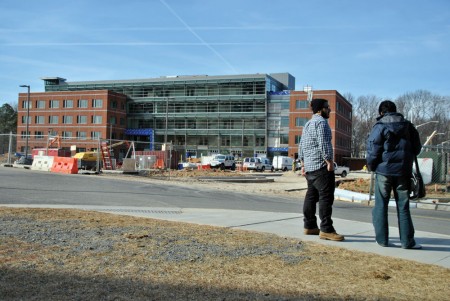
University Hall, set to open on May 15, is next to the Rappahannock River Parking Deck and will contain an Einstein Bros. Bagels. Photo byJacob McLernon
As George Mason University’s student population expands, so do the campus’ needs. More students means more faculty, more faculty means a demand for increased administrative space. The-soon to-be-finished University Hall aims to meet that demand.
“It’s a snowball effect,” said George Mason Press Secretary Daniel Walsch. “For every student you need a classroom, then more faculty and administrators. It all just builds on itself.”
University Hall will officially open on May 15, although several of the offices and administrators will have moved in early.
As of right now, University Hall is scheduled to be open during normal business hours and the first floor will remain open until all classes are finished each evening.
“The building will have three primary purposes,” said David Roe, president of the George Mason University foundation. “The first is to consolidate many off-campus operational offices at Mason into a building on campus to save the university on rental expenses. The second is to add five quality classrooms to the Fairfax Campus, and the third is to create additional retail space on campus.”
At this time the only retail company to lease space is Einstein Bros. Bagel Company, however the retail space will not be available at the time the building opens.
The process behind planning out new space is not an easy task and often times takes years to implement. University Hall has been planned and approved since May 2009.
“There are multiple layers in the decision-making process to fund a new building on any of our campuses,” Roe said. “Ultimately, the Board of Visitors has to approve the administration’s desire to add a facility and then the General Assembly decides whether or not to authorize the project as well as any related funding needed to build the facility.”
With all that has gone into University Hall and everything continuing to go into it, funding is an ever-present concern.
“If you’re growing, the trick is to be smart and efficient especially in dealing with public money,” Walsch said.
As of March 4 the cost for the University Hall project is expected to remain at $34 million.
However, the approved budget for the project is $45 million.
Since 1967, when Mason was a satellite school with two buildings for the University of Virginia, Mason has increased to over 550 acres.
“University Hall, as exciting as it may be, it’s all part of a master plan that has been involved for years,” Walsch said.
There have been five master plans in Mason’s life, the most recent of which was written in 2002.
Based on anticipated enrollment growth, Mason will need to expand over 2.1 million square feet over the next 20 years.






Comments